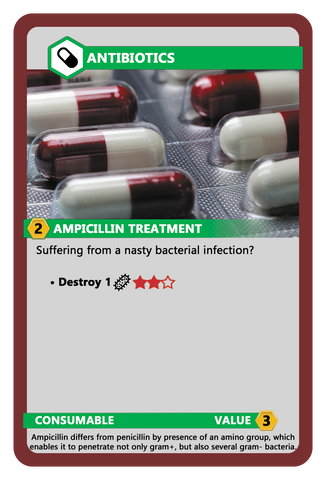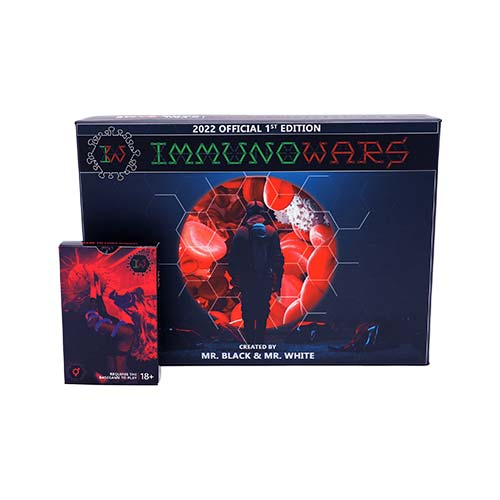Dive deep into the realm of Antibiotics, your lifeline and sometimes villains of our microbial battles. With a dash of dark humour and a sprinkle of intrigue, join Mr. White as he champions the cause of these microbial warriors. But beware, Mr. Black lurks in the shadows, ready to exploit the overuse and misuse of these potent drugs.
Ever wondered how antibiotic medicine became our go-to defence against bacterial foes? Or the looming threat of antibiotic resistance? Or why these drugs sometimes feel like frenemies? Buckle up, as we navigate the complex world of antibiotics, with our ImmunoWars champions leading the charge.
Top 5 Antibiotic Facts That Might Shock You
Hold onto your hats, because we're about to drop some antibiotic truth bombs that might just blow your mind.
1. The Accidental Discovery: Penicillin's Serendipitous Origins
In the annals of scientific history, few discoveries can rival the serendipity of penicillin. Sir Alexander Fleming, a Scottish bacteriologist, returned from a vacation in 1928 to find a mold called Penicillium notatum had contaminated his petri dishes. But instead of tossing them away, he noticed something peculiar.
The bacteria surrounding the mold were being annihilated. This "mold juice," as it was initially termed, turned out to be the world's first antibiotic, penicillin. It's a testament to the fact that sometimes, the most groundbreaking discoveries come from the most unexpected places. Imagine, a messy lab bench leading to a medical revolution!
2. Overuse: The Silent Epidemic
Antibiotics, once hailed as miracle drugs, have become victims of their own success. Their rampant overuse, especially when not needed, has given birth to antibiotic-resistant bacteria. One of the most notorious of these is Methicillin-resistant Staphylococcus aureus (MRSA).
This superbug laughs in the face of many commonly used antibiotics, making infections difficult to treat. MRSA can cause severe health complications, especially in hospital settings. Every time you pop an antibiotic for that sniffle or sore throat, Mr. Black rubs his hands in glee, knowing that the misuse is paving the way for these superbugs to thrive.
3. Not Just for Humans: Animal Agriculture's Dirty Secret
It's a lesser-known fact that a significant chunk of antibiotic production doesn't go into human medicine but into our food chain. Livestock are often fed low doses of antibiotics, not primarily to treat diseases, but to promote faster growth and to prevent diseases in crowded conditions.
This widespread use in animals contributes to the antibiotic resistance crisis. Mr. White often wonders: Are we setting ourselves up for a fall by trying to get plumper chickens and pigs? The stakes are high, and the consequences of our actions today will shape our battles against infections in the future.
4. Superbugs: Nature's Revenge
The term "superbug" sounds like something out of a sci-fi movie, but the reality is far scarier. These are bacteria that have evolved to resist multiple antibiotics. Every time we misuse or overuse antibiotics, we're essentially giving these bacteria a training session, helping them learn how to fight back. The rise of superbugs like MRSA is a stark reminder of nature's ability to adapt and fight back. For Mr. Black, these superbugs are like elite soldiers, ready to exploit the weaknesses in our defenses.
5. Natural Killers: Some Foods Act as Antibiotics
Garlic, honey, and certain spices have natural antibiotic properties. Mr. White's pantry essentials for a reason! Before the age of modern medicine, our ancestors turned to nature to combat infections. And it turns out, they were onto something. Foods like garlic, honey, and certain spices have compounds that exhibit antibiotic properties.
These natural remedies have been used for centuries, long before penicillin made its debut. While they might not replace modern antibiotics, they play a crucial role in Mr. White's holistic approach to health. After all, sometimes the best solutions are the ones that have stood the test of time.
The Global Impact of Antibiotic Resistance
Antibiotic resistance is a ticking time bomb, threatening to send us back to a pre-antibiotic era. With millions at risk of untreatable infections, global health systems are under immense strain. According to the World Health Organization, antibiotic resistance is one of the top 10 global public health threats.
Probiotics: Friends or Foes?
Probiotics, beneficial bacteria, are often touted as the antidote to antibiotic-induced gut imbalances. But do they really help, or are they just another fad? The National Institutes of Health is diving deep into this microbial mystery.
The Dark Side of Antibiotics
While antibiotics have saved countless lives, they're not without side effects. From allergic reactions to gut imbalances, these drugs can sometimes feel like a double-edged sword. The FDA has issued warnings about certain antibiotic risks.
Protecting Yourself in an Age of Resistance
In a world where bacteria are getting tougher, how do you stay safe?
- Judicious Use: Only take antibiotics when prescribed by a doctor.
- Complete the Course: Always finish the entire antibiotic course, even if you feel better.
- Avoid Self-Medication: Never use leftover antibiotics or take someone else's prescription.
- Stay Informed: Regularly check updates from reputable sources like the World Health Organization and CDC.
Antibiotics in the World of ImmunoWars
In the strategic universe of ImmunoWars, the Antibiotics card emerges as a consumable powerhouse, ready to be deployed when bacterial foes threaten to overrun the battlefield. Whether you're in the throes of a microbial onslaught or strategizing for future battles, this card offers a potent defence, but at a cost. With Mr. Black lurking with his army of superbugs, will you play your Antibiotics card wisely?


Antibiotic Cards
Card Category: Consumable
Activation Cost: Players must expend 2 ATP tokens from their energy bar.
Ability:
- Penicillin Treatment: Destroys bacteria with 2 stars severity OR Anthrax. Costs 2 ATP.
- Ampicillin Treatment: Destroys bacteria with 2 stars. Costs 2 ATP.
- Ciprofloxacin Treatment: Destroys bacteria with 2 stars severity OR Anthrax OR Mycoplasma Genitalium. Costs 2 ATP.
Resale Value: If you find yourself running low on energy and need a quick ATP boost, this card can be traded for 3-4 ATP tokens. But choose wisely, for once sold, its bacterial-busting power will be out of your hands.
Mr. White's Tactical Advice:
The Antibiotics Card is a formidable asset in your ImmunoWars arsenal. But remember, timing is everything. Other players can mutate your infection, making it antibiotic resistant. Always keep an eye on your energy bar; while selling the card can provide a quick ATP boost, you might be left vulnerable to future bacterial onslaughts.
In the high-stakes game of ImmunoWars, every card, every move, every strategy counts. Let the microbial battle begin!
FAQ
What are antibiotics?
Antibiotics are drugs that kill or inhibit the growth of bacteria. They do not work against viruses. Overuse and misuse have led to antibiotic resistance, a major global health concern. Source: WHO
How does the Antibiotic card work in ImmunoWars?
In ImmunoWars, there are multiple Antibiotic cards:
- Penicillin Treatment: Destroys bacteria with 2 stars severity OR Anthrax. Costs 2 ATP.
- Ampicillin Treatment: Destroys bacteria with 2 stars. Costs 2 ATP.
- Ciprofloxacin Treatment: Destroys bacteria with 2 stars severity OR Anthrax OR Mycoplasma Genitalium. Costs 2 ATP.
How can players counteract the Antibiotics card in the game?
Players can use various strategies:
- Play a Mutation card to make a bacterium antibiotic-resistant.
- Infect a player with MRSA, which cannot be treated with Antibiotics.
What is antibiotic resistance?
Antibiotic resistance occurs when bacteria change in response to the use of antibiotics, making them ineffective. This can lead to untreatable infections and increased mortality. Source: WHO
How can we prevent antibiotic resistance?
Prevention strategies include judicious use of antibiotics, completing the prescribed course, avoiding self-medication, and staying informed about the latest guidelines and recommendations. Source: CDC
Conclusion
Antibiotics, the double-edged swords of ImmunoWars, have reshaped our microbial battles. As we tread this complex terrain, remember to stay informed, use antibiotics wisely, and immerse yourself in the thrilling world of ImmunoWars. Will you champion the cause of antibiotics or exploit their weaknesses? The battleground is set. Choose your side and let the ImmunoWars begin!


